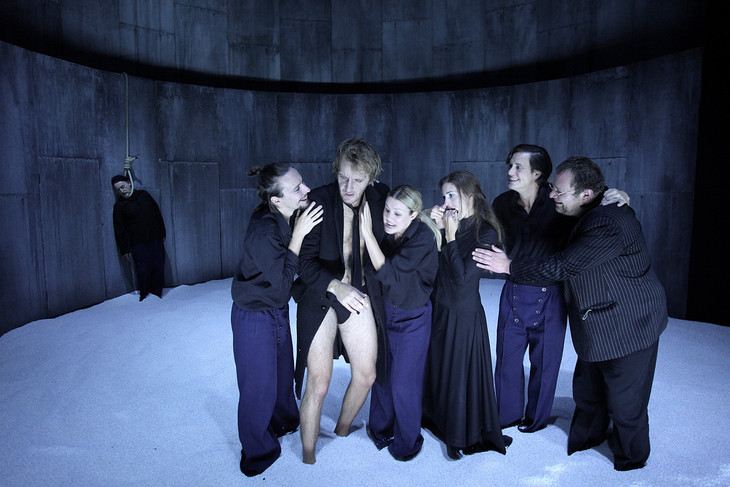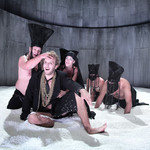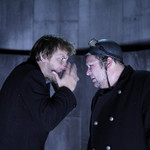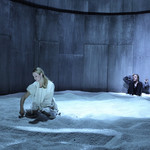Henrik Ibsen
Peer Gynt
Ljubljana City Theatre and Slovene Permanent Theatre in Trieste
Première: 8. 10. 2015, Ljubljana City Theatre; 6. 11. 2015, Slovene Permanent Theatre in Trieste
Running time 2 hours 30 minutes. One interval.
Translator Milan Jesih
Director and music selector Eduard Miler
Author of adaptation and dramaturg Žanina Mirčevska
Set designer Branko Hojnik
Costume designer Jelena Proković
Language consultant Maja Cerar
Lighting designer Andrej Hajdinjak
Assistant to costume designer Barbara Vrbančič
Cast
Peer Gynt Matej Puc
Aase/Solveig/Troll-witch/Oriental Dancer/Hussein/Woman in Black Iva Krajnc
Aslak/Dovre-Master/A Voice in the Darkness/Oriental Dancer/Begriffenfeldt/Strange Passenger/ Button-Moulder Primož Pirnat
Mother/Ingrid/Woman in Green/Anitra/Huhu/Sailor 2 Nina Rakovec
Bridegroom/Young Troll/Ugly Child/Monsieur Ballon/Oriental Dancer/Lunatic/Cook/Thin Man Domen Valič
Wedding Guest/Troll-courtier/Mr. Cotton/Oriental Dancer/Lunatic Mummy/Sailor 1 Jure Kopušar as guest
Father/Troll-oldest courtier/Herr Trumpeterstraale/Oriental Dancer/Fellah/Captain Vladimir Jurc
The dramatic poem Peer Gynt is an amalgam of real-life events interwoven with autobiographical elements and a fairytale world full of symbols, enabling all sorts of interpretations. It belongs to a gallery of the most significant dramatic heroes of all times. Its story and intentions place it hand in hand with Don Quixote, Faust, Hamlet, Don Juan … The young Peer lives with his mother. Their everyday life is seemingly poor yet full of wild untamed
rides through imaginary landscapes, through stories, through fairytales, poems, mirages … Peer grows into a turbulent, demanding and seductive dreamer. "Two souls” fight their battle within him: one, deriving from the fairytale world, drives him towards all that is beautiful and ethical, while the other part of his nature lures him towards the unknown, risky, mysterious, dark.
If the core and the driving force of the dramatic poem is Peer’s quest for himself and the reliance on self-sufficiency that manifests itself in the self-fulfilment of desires, then the ending is sobering and proportionally bitter. Peer Gynt is one of the most beautiful stories of a human, a bold explorer, and of love as a fundamental connective tissue of all that is.
"Peer is Miller-like refined, staged amid the inevitable coolness of an empty stage, minimalism and the reduction of means in which at times Peer’s sole "companions” are light, shadow and echo. /…/ Essentially, the focus of the productions is clear: Peer Gynt is above all a concentrated actor’s creation exposing a very clear, solid and thoughtfully measured dramaturgical arc of the character, from his establishing to his disintegrating and decomposing.”
Nika Leskovšek, Dnevnik, 20 October 2015





